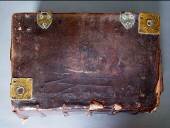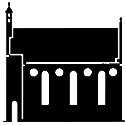The Forgue Old Kirk Bible 1616
The King James Bible of 1616 was discovered in 2014in a safe left in the church when it was sold by the Church of Scotland in 1998. It was recently opened with a new key and inside was the 1616 King James Bible inscribed “This bible belongs to the Church of Forgue” and “This bible belongs to James Douglas Cordiner 27th April 1845”.
Rev James Douglas Cordiner (1786 – 1849) was Minister of Forgue from 1834 to 1849.
It relates to a very critical period in the history of the Parish of Forgue – The Disruption of 1843 when the Free Church of Scotland was formed. Forgue Old Kirk and Rev Cordiner remained within the Church of Scotland and it may be that this bible relates to his ministry.
It is not known at what date the bible came into the Kirk’s possession.
A biography of Rev James Cordiner, Minister from 1834 until his death in 1849, is published in ‘Robert Simpson of Cobairdy’ by Cryle Shand 2011 and notes from Sir William and Rev Lady Margaret McKay.
The bible was very poor condition and is missing the frontispiece and part of the book of Genesis. Many leaves were folded over. The binding is contemporary in leather on elm boards with brass studs. It was worn and damaged.
The bible was repaired and is available in the Kirk Session House Heritage Centre for display on our open days and is to be available for inspection.





Rev. James Douglas Cordiner
James Cordiner was born in Aberdeen in 1786 and got his degree from Aberdeen University in 1808. He was initially Schoolmaster at Gartly in 1825 and was licensed as an assistant Preacher for 9 years before he was presented to the living of Forgue in 1834. He died at the Manse of Forgue in 1849. This means that he was Minister of Forgue during one of the most interesting periods of Church History – the Disruption of the Church of Scotland.
Mr Cordiner was a moderate through and through. The Strathbogie Seven were very nearly the Strathbogie Eight. Although he was present at the induction of Mr Henry to the Charge of Marnoch he did not take part so he got let off the hook when the Strathbogie Ministers who defied the General Assembly got called to the Bar to reason their actions.
He was an eccentric and was described by the Fife Herald on 7th October 1841 (two years before the disruption) as an “enormous Church Rat” – the Paper must have been evangelically bent! They go on to say that he preached so badly regarding the beginnings of the schism that seven individuals walked out of the service – including all the Heritors present.
Robert Simpson, one of the Heritors of Forgue Parish, took Mr Cordiner to Court in 1845 over what was said about Mr Simpson from the Pulpit by Mr Cordiner. The Oversman of the Arbiters found James Cordiner guilty and fined him £5 damages and £119 16s 11d expenses.
It is said that when Mr Matheson the Free Church Minister met Mr Cordiner on the bridge at Forgue a fight ensued and Mr Cordiner stabbed Mr Matheson with a pen nib. He was again in Court but this time in Huntly, and was fined.
In 1849 Mr Cordiner died in situ and is buried in the graveyard at Forgue under a recumbent stone by Ministers’ Row.
Who was the Minister in 1616?
The Minister in 1616 was a James Hay who was Minister before 1608, in 1610 was a member of the General Assembly and was known to be still in Forgue in 1620. His successor took over in 1628.
What was going in the Church in Scotland in 1616?
The Reformation in Scotland in 1560 is usually portrayed as violent and radical. It was in fact nothing of the sort. It did not need to be - the old Church collapsed like a pack of cards, and for several decades there was uncertainty about how reformed the Church was to be. Bishops remained but they were not allowed to govern the Church.
When James VI came of age, he realised that without bishops he could not control the Church. Bishops subject to a General Assembly were no good to him. To make matters worse, Presbyterianism began to spread across the country, stronger in the south than here in the north. The King responded by appointing bishops as 'constant moderators' of presbyteries, gradually adding to their status until he had in effect re-created old-style bishops.
These were the difficult times in which the Bible was printed.
Forgue Bibles
Forgue Old Kirk has six old lectern bibles collected during the past two hundred years. These are regularly displayed at Friends of Forgue Kirk 'Open Days'.
